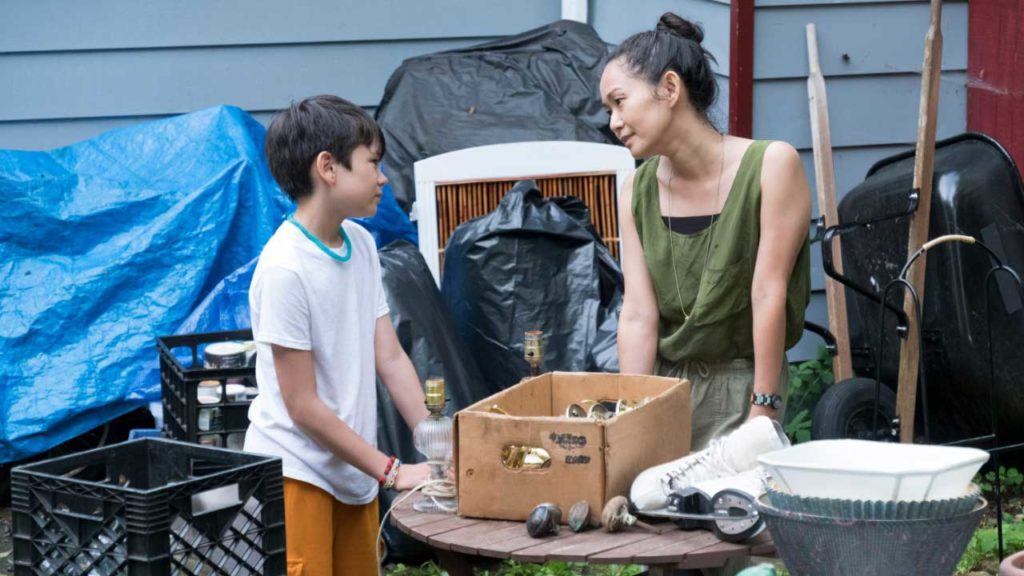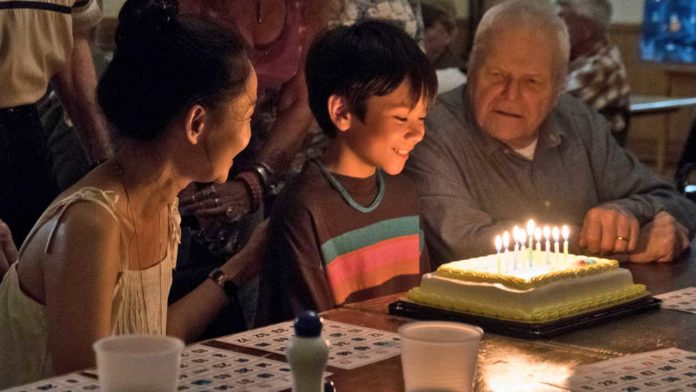Out gay filmmaker Andrew Ahn made an auspicious debut with his 2016 drama, “Spa Night.” His sophomore feature, “Driveways,” available on demand May 7, reinforces his talents at telling emotionally affecting stories.
This lovely, gentle film has single mother Kathy (Hong Chau) taking her eight year-old son Cody (Lucas Jaye) to clean out her late sister April’s house. Kathy quickly discovers her sister — whom she did not know well — was a packrat. As she faces the daunting prospect of cleaning out the house she needs to sell, Cody befriends Del (Brian Dennehy), a lonely veteran who lives next door.
In a recent phone interview, Ahn spoke about his new film, things that give him comfort, and working with the late Brian Dennehy.
“Driveways” isn’t a story you wrote, and it is not a personal, queer film, like “Spa Night.” What drew you to make this film?
After I made “Spa Night,” I realized I was kind of sick of myself. I made an intense, personal film that was really gay and really Korean. I wanted to try something outside of my own experience. I hunted for a screenplay by other writers that would resonate with me. When I read “Driveways,” I saw something in it that felt weirdly familiar to me. Cody as a sensitive, vulnerable boy who quietly observes the world — that felt like how I was as a kid and how David was in “Spa Night.” There was also this general philosophy in my films that that drama isn’t caused by a villain or hatred, but by love. These characters love each other too much. That’s compelling and special — especially when telling queer stories. I wanted to make a story of compassion and I saw that quality in “Driveways.” I adjusted Kathy to be Asian and made the film subtly queer.

Kathy has very little emotion for April’s things, but the film’s tone is a bit sentimental. Can you talk about creating or eschewing this emotion?
I didn’t want the film to feel melodramatic or sappy. I wanted it to feel real. That’s what I love about Hong’s portrayal of Kathy. There is this emotional response she had going through her sister’s things, and also that she has to deal with the labor of it all. As much as you might want to have an emotional connection to your sister’s things, it’s not your sister, it’s just her stuff. I worked with my cinematographer from “Spa Night” to create a very subjective experience with space in the film to mirror the emotional state of these characters. I wanted that scene where Kathy discovers [April’s] hoarding to be almost a nightmare — claustrophobic and dark. We also had to emphasize the family drama because we didn’t have the titillation of the Korean spa to give the film an extra edge.
There is a line about April finding comfort in things. What things do you find comfort in?
[Laughs] Because I’m a filmmaker, and what I make feels so intangible — I can’t hug my movies — I do have a strange fascination with tactile hobbies. I knit beanies and scarves, and it’s kind of silly, but I kind of love it. I like seeing something that I build stitch-by-stitch. Over the time of this pandemic, I’ve become obsessed with houseplants, because I like seeing them grow and have something to take care of. I do have a sentimental side to me, and there’s something about his film that made me think about the things we leave behind and what significance do they have?
Yes, one of the striking themes in the film is the idea of processing loss.
I have been thinking about that a lot, both making the film but now with Dennehy’s passing and two of my grandparents passing away. How do we deal with that and process that emotion that grief? I don’t pretend to have an answer, or that “Driveways” offers an answer, but it meditates on that question and poses the question to the audience. How would you deal with it?
You mentioned Dennehy’s passing. “Driveways” is going to be remembered as one of his last films.
It was such a privilege to have worked with him on this. The film feels like a proper tribute to him not only as an actor but also as a human.
Let’s talk about human connection and community. The main characters in “Driveways” are looking for a sense of belonging, and self-worth, which was also a key theme in “Spa Night” as well. What observations do you have about this theme in your work?
For me, it is human nature to want to find a place where you belong, feel comfortable, and feel like yourself. This search for a home in “Driveways” felt so universal to me, and something I had insight into because it was a similar journey for my main character in “Spa Night” — how do you find a place where you feel like yourself, and feel validated for who you are? When Del tells Cody, “You’re a good kid,” that’s the most intense version of saying, “I belong here.” I have the feeling this is going to be a theme that pops up in every piece of work that I do.

